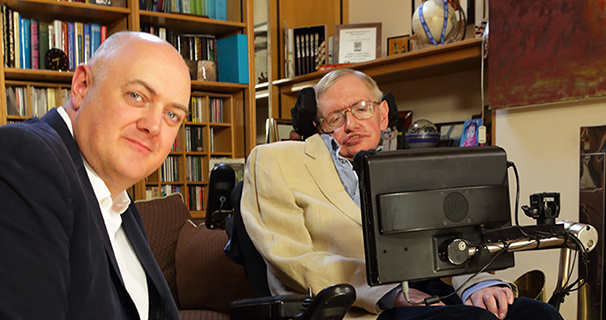Dara O Briain: 'Stephen Hawking told me his biggest regret was not being able to play with his children'

The latest updates, reviews and unmissable series to watch and more!
You are now subscribed
Your newsletter sign-up was successful
Want to add more newsletters?

ONCE A WEEK
What to Watch
Get all the latest TV news and movie reviews, streaming recommendations and exclusive interviews sent directly to your inbox each week in a newsletter put together by our experts just for you.

ONCE A WEEK
What to Watch Soapbox
Sign up to our new soap newsletter to get all the latest news, spoilers and gossip from the biggest US soaps sent straight to your inbox… so you never miss a moment of the drama!
Comedian Dara O’Briain, 43, who has a degree in mathematics and theoretical physics, has been a huge Professor Stephen Hawking fan ever since his parents gave him a copy of the world famous scientist’s legendary book, A Brief History of Time, for Christmas 1988.
So, he was over the moon when he was given the chance to hang out with his idol for a new BBC1 documentary (Tuesday, June 16)/
Here, the Mock the Week star talks to TV Times about his jitters talking to his hero, the scientist’s thoughts on the Oscar-winning film about his life and the 73-year-old scientist’s biggest regret…
What was your first interview with Stephen like?
“I knew it was going to be a slow process because it takes him about 10 minutes to compile a sentence [Stephen uses a voice synthesizer and the muscles in his face to communicate].
“You see me at the start of our first interview looking slightly uncomfortable and not knowing how to handle these long pauses, which meant I started babbling a bit. People don’t know how to react around him because they don’t know how to talk to him and that can make him feel a bit lonely.
“I was a prime exhibit of that, but then I relaxed into it and you realise that this is very much your discomfort, not his, and that you should just calm down, shut up for a minute and wait for his answers.”
The latest updates, reviews and unmissable series to watch and more!
How much time did you spend with Stephen?
“I got to see him five or six times, both at his Cambridge home and at work. I also met Lucy and Tim, who’re two of his three children [Stephen’s eldest child, Robert, lives in America].
“Stephen told me that his biggest regret was not being able to physically play with his children when they were little because of his illness and I was happy that he was prepared to be that honest with me, because he had no reason to be. But I suppose when you’re choosing your words as carefully as he does, why waste them on waffle?”
As a father yourself, you must have been moved by that answer?
“I was moved and I told him that. They all get along very well as a family and I enjoyed asking him the normal dad-to-dad questions. He played board games with them as children and wouldn’t let them win!
“There’s a gorgeous piece of footage in the documentary of Stephen as a younger man with his kids hanging off his wheelchair and him wheeling them around his garden.”
What struck you the most about him?
“That he is a normal guy. We tend to think of him in terms of these two extremes, either the crippling illness or the fact that he has the ‘greatest mind in the world’.
"But there’s a moment where you get past the chair and him as an icon and he becomes this normal guy with a messy life, who’s an enthusiastic host and someone who’s used his fame to do fun things like going into zero gravity.”
What did Stephen think of the recent Oscar-winning biopic of his younger self, The Theory of Everything?
“He said watching it was the closest he’d ever get to going in a time machine and that watching his life back was very unusual. He just wished there was more physics in it and he also said he wished there was more physics in this documentary!”
In 1963 doctors told him his motor neurone disease would only give him two years to live. How has Stephen defied that diagnosis more than 50 years later?
“The general impression people have now is that Stephen has a different form of motor neurone disease, where he has the same symptoms, but it’s occurring at a slower rate. He’s the longest surviving motor neurone patient in the world and, I presume, in history.”
Did you ask Stephen to sign your copy of a Brief History of Time?
“Yes [Stephen signs his books with his thumb print]. When I started making this, I thought I wouldn’t be able to find my original hardback copy and I’d have to fake it by buying one off eBay. But when I went to look, I found it still on my bookshelf. And I’m very pleased he’s signed it!”

